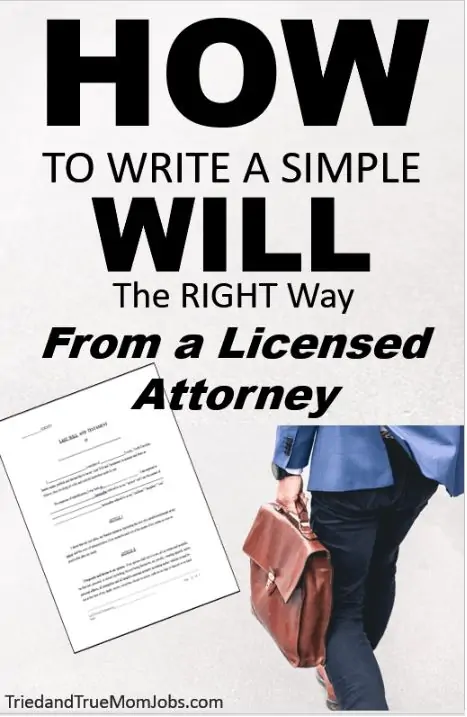How to Write a Will the Right Way from a Licensed Attorney

How to Write a Simple Will
Do you know what happens when you die without a Will?
Well, your assets, property, business, valuables, etc. will be left up to the state.
Are you okay with that?
I’m not either and that’s why I’m going to show you How to Write a Will the RIGHT WAY.
You can rest assured the information in this article is not from a series of Google searches BUT from a licensed attorney that I was privileged to interview to help us all understand exactly what we need to know when writing a Will.
Erin A. Moss Ferguson, Esq. is a licensed attorney in the State of Michigan and the United States District Court in the Eastern District of Michigan1.
I’ve put off writing a Will for far too long, and to be honest I really didn’t know what to do, how to write it, or how to make it official so this article is just as much for me as it is for you.
Can We Challenge Ourselves Today? After reading this article WE WILL commit to writing our Will this WEEK.
It really does not take that much time to do and you can always revise it later but let’s get SOMETHING written down, okay? Make sure you “pin” this article to refer back to it.
As my Dad jokingly but so truthfully stated, “None of us are going to make it out of here alive”.
So lets MAN/WOMAN UP and take care of business so our loved ones will have clear direction when the inevitable happens.
This post contains affiliate links, which means I may receive a small commission, at no cost to you, if you make a purchase through a link.
Here’s the Information You Need to Write a Simple Will
1. Do You Need a Lawyer to Make a Will?
Generally speaking, you do not need a lawyer to write a will. However, in order to craft what is considered a valid Will in your state, you should research your state’s laws to determine the specific requirements.
After you’ve done some initial research and decided what you would like to accomplish in writing your will, it is your personal preference as to whether or not you decide to hire an attorney.
A consultation with an attorney or an estate planning professional may be helpful so that you can discuss different options that may accomplish your overall goals in drafting a Will.
As an attorney, I would strongly suggest seeking advice from an attorney, especially if any of the following apply to your personal situation:
- If you own any of the following:
- a business (or businesses),
- real estate property,
- stocks, bonds, or other investments,
- family heirlooms, or
- valuable collectibles;
- If you have children or other dependents for whom you are financially responsible;
- If you are married or have a domestic partner with whom you share a home or finances;
- If you plan to donate any real property or other assets to a charitable organization upon your death;
- If you have very specific wishes as to what happens with your body (e.g. organ donation, cremation) upon your passing; or
- If you have already written a will, but your life circumstances have since changed (e.g. you have gotten married or divorced, or had or adopted additional children).
2. How Does One Write a Will Without Lawyer?
If you decide not to hire an attorney to draft your Will, you should know some basic terminology to help you through the process.
- The person who is writing a will is called a testator.
- A valid will is one that is legally binding in the state in which it was drafted.
- A beneficiary is an individual who is to inherit money or other property from a will.
- An estate means all the money and property owned by a person, particularly at death.
- An executor is a person who is named in a will or is otherwise appointed and has the responsibility of taking care of the testator’s affair or their estate after they have died. An executor is also referred to in some states as a personal representative.
- In the context of a will, after a person dies, they are referred to as the decedent.
- If the decedent dies without a will, that person is said to have died “intestate.”
Requirements to Create a Valid Will2:
In general, a person must be of the age of majority (18 years old in most states), of sound mind, and not under the undue influence of another person (or otherwise under duress). After those elements are met, the additional elements vary from state to state.
For example, in Michigan, the testator must be 18 years old, and of sound mind. The will must be in writing. If the will is handwritten, it must be signed3 by the testator. If the will is typewritten, it must be signed by the testator and at least two witnesses4. The will must also be dated.
In Ohio, the requirements are similar. However, whether the will is handwritten or typewritten, it must be written and signed by the testator in the presence of two or more competent witnesses, or the witnesses must have heard the testator acknowledge their authoring and signature of the will.
Keep in mind that in some states, a valid will must also be notarized. So, in addition to witnesses, you may also need the services of a notary.
Related article: How to Become a Notary
There are several websites that advertise to assist in writing a Will or to provide you with a form for a fee. However, be sure to check with your state’s website (.gov) first. You may find forms that you can download and complete for free.
3. After You Write Your Will What Should You Do With It?
If possible, you should discuss the contents of your will with those whom it affects, or at least tell the primary beneficiary, or the person whom you trust the most that you have written a will.
Your will should be kept in a safe place like a safe deposit box where a partner/spouse, trusted relative, or your attorney will have access to when it is needed. If you decide to keep your will in your home, it is a good idea to keep it in a fireproof safe.
4. What Happens If You Die Without a Will?
An individual who dies without a will dies “intestate.” In this case, the laws of the state in which the decedent resided before their death will determine how any assets are divided. The matter of the decedent’s estate will have to go to probate court. Probate proceedings will determine the value of the decedent’s estate, who the beneficiaries are, and who the executor will be.
Dying intestate means that any wishes the decedent may have had as to how their assets are distributed may not be honored. It also means that the decedent’s potential beneficiaries may have to go through court proceedings to determine what otherwise could have been set forth in a will. In the interim, financial obligations of a surviving partner/spouse, or the needs of dependents may be difficult to meet.
5. Any Advice or Suggestions for Those Writing a Will?
Consider who the most important people are in your life. This also means considering who may be tasked with making your final arrangements. Is this an expense that you should outline in your will, or have you made other arrangements?
Be clear and concise in your description of real and personal property, and any wishes or instructions that involve dependents (including aging or ailing parents). Although it may be difficult, talk with your partner/spouse, children, or other individuals that your will may affect. Consider naming primary and secondary beneficiaries, so that, in the event that your primary beneficiary is unavailable, your desired outcome can still be fulfilled. Consider having a conversation with the person that you would like to be the executor of your estate to determine if that is something that they would want to do. This will allow you to choose another executor if your first choice is not up for the task.
Remember that a will is different than a durable power of attorney to handle finances or a healthcare advocate who can make healthcare decisions on your behalf in the event that you are incapacitated and unable to make healthcare decisions on your own. You may want to consider naming those individuals in addition to naming an executor, especially if you are not married.
Also, remember that a will is just one way to gift or leave things to beneficiaries. You may decide it best to protect your assets with a trust in addition to a will.
Finally, remember that a will operates separately from any fund with a named beneficiary like a life insurance policy, joint bank accounts, and real property owned in joint tenancy. These assets will automatically pass to the named beneficiary or the other joint account holder upon the decedent’s death.
1 The details provided herein are for information purposes only, to provide a general framework of what an individual may need to consider when drafting a will. No attorney-client relationship has been formed upon the presentation of this information. Nor does this information constitute legal advice.
2 This list is not meant to be exhaustive of the elements needed to create a valid will in the states used as examples or in any state in particular. Please consult the laws of your state and a licensed attorney or estate planning professional who can asses what your state requires and address your specific needs.
3 The definition of “signed” may vary if a person is physically unable to sign their will. Please refer to your state’s requirements.
4 Some states require that the witnesses are not potential beneficiaries of the will. Please refer to your state’s requirements.
5 Wills and trusts have different requirements and legal implications. Please consult a licensed attorney in your state.
Wow, thank you SO much Erin for such a thorough interview on how to create a will and information we really should have paid for.
I know myself so I’m going to handwrite my wishes now and buy a safe just to get something started.
When are you going to write your Will?
If you have any questions, please drop us a note in the comment section.
If you want to get updates on work from home opportunities, ways to save, and invest make sure you subscribe to our mailing list.
You Might Also Like:
20 Passive Income Ideas from Millionaires
30 Ways to Make Money from Home
20 Stay at home Mom Jobs that Moms do Today

It’s good to know that you should consult with an attorney regarding your will if you own property. As a homeowner and landlord myself, I have been considering creating a will to protect my assets. I think I will look for a lawyer in my area to help me with this process.